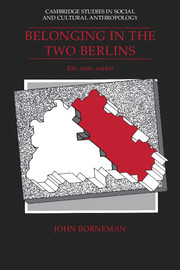Book contents
- Frontmatter
- Contents
- List of figures
- List of tables
- Acknowledgments
- Introduction
- 1 Naming, categorizing, periodizing
- 2 Clarification of concepts
- 3 Demographics of production and reproduction
- 4 State strategies and kinship
- 5 Victimization, political reconstruction, and kinship transformations in East Berlin: Generation I
- 6 Sentimentalization, fear, and alternate domestic form in East Berlin: Generation II
- 7 Hausfrauenehe and kinship restoration in West Berlin: Generation I
- 8 Politicized kinship in West Berlin: Generation II
- 9 Marriage, family, nation
- Postscript: unity
- Notes
- References
- Index
- Cambridge Studies in Social and Cultural Anthropology
7 - Hausfrauenehe and kinship restoration in West Berlin: Generation I
Published online by Cambridge University Press: 05 June 2012
- Frontmatter
- Contents
- List of figures
- List of tables
- Acknowledgments
- Introduction
- 1 Naming, categorizing, periodizing
- 2 Clarification of concepts
- 3 Demographics of production and reproduction
- 4 State strategies and kinship
- 5 Victimization, political reconstruction, and kinship transformations in East Berlin: Generation I
- 6 Sentimentalization, fear, and alternate domestic form in East Berlin: Generation II
- 7 Hausfrauenehe and kinship restoration in West Berlin: Generation I
- 8 Politicized kinship in West Berlin: Generation II
- 9 Marriage, family, nation
- Postscript: unity
- Notes
- References
- Index
- Cambridge Studies in Social and Cultural Anthropology
Summary
Silence plagued the postwar life of Generation I in West Berlin much as it did the lives in the East. The silencing of this generation, born approximately between 1910 and 1935, limited its competence in articulating present needs as well as its ability to confront the role of the past in ongoing lives. While this unfilled, erased space enervated the individual, it proved enabling for the two nascent states. In both East and West, this silence was filled in by the state: for those in the East through work programs connected with the Aufbau, for those in the West by creating conditions for the Wirtschaftswunder. Both economic plans were state-inspired visions of the future, master narratives of prosperity that would please the Bürger and legitimate the governing system.
This mirror-imaging in economic categorization, socialist Aufbau versus capitalist Wirtschaftswunder, was not sustained, however, by a comparable periodization. The Aufbau, as economic period and category of experience, lasted until approximately 1961, whereas the Wirtschaftswunder, at least for Generation I, is continuing today. Hence East Berliners, who in the fifties began finding their voice in the state's master narrative of construction, felt themselves stymied into a nostalgia trip by the mid sixties, a reminiscence increasingly blind to or bitter about a failing economic plan, augmented by a selective memory that either created new silences or new dissatisfactions.
- Type
- Chapter
- Information
- Belonging in the Two BerlinsKin, State, Nation, pp. 202 - 236Publisher: Cambridge University PressPrint publication year: 1992



